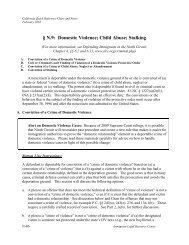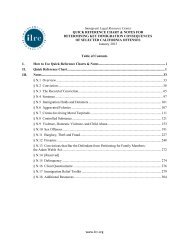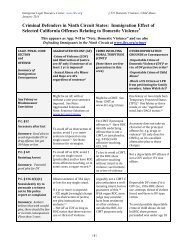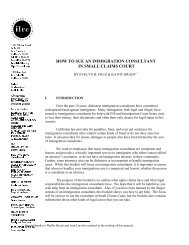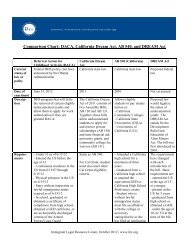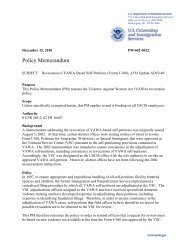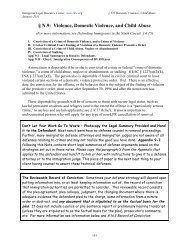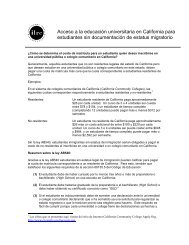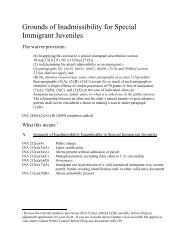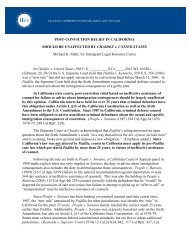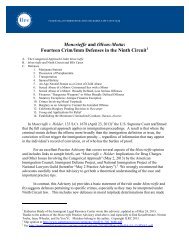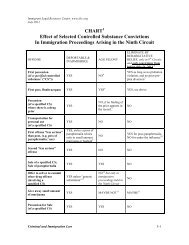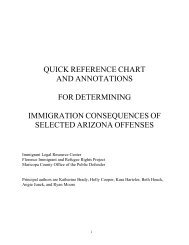quick reference chart and notes for determining immigration - ILRC
quick reference chart and notes for determining immigration - ILRC
quick reference chart and notes for determining immigration - ILRC
You also want an ePaper? Increase the reach of your titles
YUMPU automatically turns print PDFs into web optimized ePapers that Google loves.
Cali<strong>for</strong>nia Quick Reference Chart <strong>and</strong> Notes<br />
February 2010<br />
§ N.12 Firearms Offenses<br />
(For more in<strong>for</strong>mation, see Defending Immigrants in the Ninth Circuit, §§ 6.1, 9.18,<br />
www.ilrc.org/criminal.php)<br />
A. The Firearms Deportability Ground<br />
A noncitizen is deportable if at any time after admission into the United States he is<br />
“convicted under any law of purchasing, selling, offering <strong>for</strong> sale, exchanging, using, owning,<br />
possessing or carrying or of attempting or conspiring to [commit these acts] in violation of any<br />
law, any weapon, part or accessory which is a firearm or destructive device (as defined in [18<br />
USC § 921(a)] …” 8 USC § 1227(a)(C). An offense as minor as possession of an unregistered<br />
weapon can trigger deportability.<br />
Sections 245(a), 245(d) <strong>and</strong> 12020(a) are divisible, in that they reach weapons that are<br />
<strong>and</strong> are not firearms. Counsel should designate a non-firearm, or at least leave the record vague<br />
as to whether the offense was a firearm. For further discussion see § N.14, “Safer Pleas.”<br />
There is no firearms ground of inadmissibility. A noncitizen—including a deportable<br />
permanent resident—who is deportable but not inadmissible can apply <strong>for</strong> “adjustment of status”<br />
(to become a permanent resident, <strong>for</strong> example based on a family visa petition) if she is otherwise<br />
eligible. This applies to non-permanent residents as well as deportable permanent residents who<br />
wish to “re-adjust” as a defense to deportation. If adjustment is granted the person will no longer<br />
be deportable based on the conviction. 174 Adjustment of status is discretionary relief, <strong>and</strong> the<br />
applicant must be able to persuade the DHS or <strong>immigration</strong> judge to grant it.<br />
B. Firearms Offenses as Aggravated Felonies<br />
Any offense involving trafficking in firearms <strong>and</strong> destructive devices (bombs <strong>and</strong><br />
explosives) is an aggravated felony. For example, sale of a firearm under P.C. § 12020(a) is an<br />
aggravated felony. State statutes that are analogous to designated federal firearms offenses are<br />
aggravated felonies. 175 Significantly, conviction of being a felon or addict in possession of a<br />
firearm under P.C. § 12021(a)(1) is an aggravated felony. 176<br />
A firearms offense that involves violence, or the threat or risk of violence, may be classed<br />
as a crime involving moral turpitude. If a sentence of a year or more is imposed, it may be an<br />
aggravated felony as a crime of violence.<br />
174 Matter of Rain<strong>for</strong>d, Int. Dec. 3191 (BIA 1992). If the person also is inadmissible under a ground that can be<br />
waived, a waiver can be submitted with the adjustment application. Matter of Gabryelsky, Int. Dec. 3213 (BIA<br />
1993).<br />
175 8 USC § 1101(a)(43)(C), (E), INA § 101(a)(43)(C), (E).<br />
176 United States v. Castillo-Rivera, 244 F.3d 1020 (9 th Cir. 2001).<br />
N-110 Immigrant Legal Resource Center



